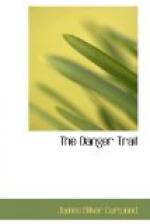Half a dozen steps away was a table and on the table a lamp. Croisset lighted it, and with a quiet laugh faced the engineer. They were in a low, dungeon-like chamber, without a window and with but the one door through which they had entered. The table, two chairs, a stove and a bunk built against one of the log walls were all that Howland could see. But it was not the barrenness of what he imagined was to be his new prison that held his eyes in staring inquiry on Croisset. It was the look in his companion’s face, the yellow pallor of fear—a horror—that had taken possession of it. The half-breed closed and bolted the door, and then sat down beside the table, his thin face peering up through the sickly lamp-glow at the engineer.
“M’seur, it would be hard for you to guess where you are.”
Howland waited.
“If you had lived in this country long, M’seur, you would have heard of la Maison de Mort Rouge—the House of the Red Death, as you would call it. That is where we are—in the dungeon room. It is a Hudson Bay post, abandoned almost since I can remember. When I was a child the smallpox plague came this way and killed all the people. Nineteen years ago the red plague came again, and not one lived through it in this Poste de Mort Rouge. Since then it has been left to the weasels and the owls. It is shunned by every living soul between the Athabasca and the bay. That is why you are safe here.”
“Ye gods!” breathed Howland. “Is there anything more, Croisset? Safe from what, man? Safe from what?”
“From those who wish to kill you, M’seur. You would not go into the South, so la belle Meleese has compelled you to go into the North, Comprenez-vous?”
For a moment Howland sat as if stunned.
“Do you understand, M’seur?” persisted Croisset, smiling.
“I—I—think I do,” replied Howland tensely. “You mean—Meleese—”
Jean took the words from him.
“I mean that you would have died last night, M’seur, had it not been for Meleese. You escaped from the coyote—but you would not have escaped from the other. That is all I can tell you. But you will be safe here. Those who seek your life will soon believe that you are dead, and then we will let you go back. Is that not a kind fate for one who deserves to be cut into bits and fed to the ravens?”
“You will tell me nothing more, Jean?” the engineer asked.
“Nothing—except that while I would like to kill you I have sympathy for you. That, perhaps, is because I once lived in the South. For six years I was with the company in Montreal, where I went to school.”
He rose to his feet, tying the flap of his caribou skin coat about his throat. Then he unbolted and opened the door. Faintly there came to them, as if from a great distance, the wailing grief of Woonga, the dog.
“You said there was death here,” whispered Howland, leaning close to his shoulder.




